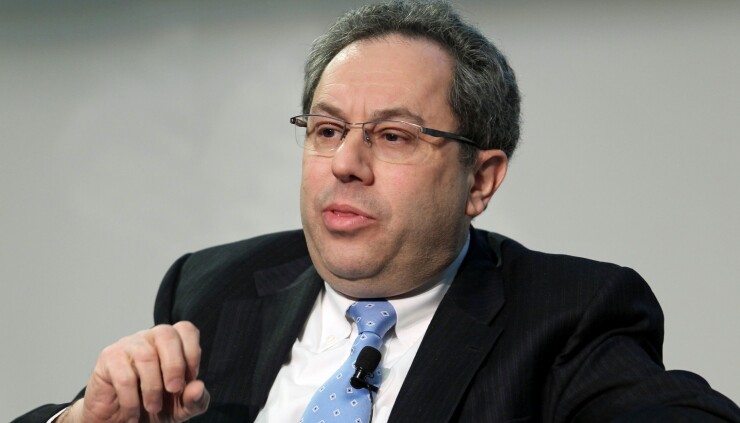Chicago, assembling a budget deeply impacted by the COVID-19 pandemic, can’t afford to dip deeply into its $900 million of reserves without jeopardizing its bond ratings and setting back efforts to structurally balance its books, the city’s chief financial officer warned aldermen.
CFO Jennie Huang Bennett spoke to City Council members Monday as Mayor Lori Lightfoot’s administration began the hard sell of its

The 2021 package also relies on a $97 million property tax hike that includes an ongoing annual increase tied to inflation and job cuts that could result in 350 layoffs. There’s a $30 million draw on the reserves.
Council members widely opposed to the property tax hike pressed the finance team on why it’s not tapping more from reserves.
"We've looked at a lot of options…to try to avoid a property tax increase but the problem is that it's just too large a gap,” Bennett told aldermen during a budget committee hearing. Drawing from reserves could drive a downgrade, which would drive up borrowing costs. Bennett estimated that downgrades would add $345 million to every $1 billion of borrowing.
The city’s general obligation credit is rated junk-level Ba1 by Moody’s Investors Service, BBB-minus by Fitch Ratings, BBB-plus by S&P Global Ratings, and A by Kroll Bond Rating Agency.
Pressed on whether an $850 million draw would trigger a downgrade, Bennett put the “magic number” needed in reserves at 20% of expenses in the city’s $4 billion corporate fund: $800 million. “We are flirting on the edge of that” in future years, Bennett warned.
The finance team was also urged to consider borrowing even more than the proposed $1.7 billion financing that includes the $950 million scoop-and-toss of debt payments due this year and next into future years. But Bennett warned that too could drive a downgrade.
“We've looked at the debt metrics 10 different ways and how it is that we are adding, in essence, to our debt burden,” Bennett said. “We've pushed the envelope in a lot of different ways. I'm not 100% sure we are going to get through the budget season without a downgrade.”
Bennett said the finance team’s thinking is based on rating agency reports and analyst discussions and their actions on other credits like Illinois that don’t benefit from reserves. There’s also a need to offer a plan that shows rating agencies structural balance can be accomplished in the coming years.
The downgrade warnings are a fresh argument for by administration after Bennett warned the reserves are needed as a buffer in 2022 as the city faces a $1.5 billion gap and no guarantees that the pandemic’s impact won’t linger or that federal relief is coming.
Bennett said the finance team spent a lot of time trying to strike the balance on one-shots and the use of debt restructuring and reserves. The reserves “help balance” the credit impact of the city’s low status among rating agencies driven in large part by its massive $33 billion net pension liability.
Bennett stressed to aldermen the need to use recurring measures to tackle the $400 million structural piece of the $1.2 billion gap because relying on one-shot actions like the debt restructuring that are already being employed to deal with the one-time tax losses will make balancing the budget all the harder in 2022.
“We have to be continuing to walk that path toward structural balance,” Bennett said. S&P Global Ratings the outlook
The 2021 fixes are 47% structural in nature with non-recurring measures covering the rest of a gap that’s divided between an $800 million pandemic tax hit and $400 million in anticipated structural costs. The city will carry over nearly $900 million in prior federal relief aid that can only be used to cover eligible pandemic-related costs.
Lightfoot pitched the city in a webinar presentation to guest of the Municipal Forum of New York on Friday. “We are still on track to reach structural balance by 2023 all while pushing forward a progressive reform agenda,” she said.
The road to structural balance is steep because pension payments jump by $400 million heading into 2022 as the city completes it shift to actuarially-based contributions for all four of its funds. The scoop-and-toss will lower debt service in 2020 and 2021 to $200 million to be followed by a $600 million jump to $800 million anticipated in 2022.
Chicago GOs already trade at a high yield spread penalty of more than 300 basis points to the Municipal Market Data’s AAA benchmark.
While other governments are relying heavily on one-time measures like the scoop-and-toss, Chicago’s plan is more damaging to its credit because of its long history of such tactics and its big pension burden, said Municipal Market Analytics.
“The gimmicks the city’s budget is now relying on — in particular a huge and decades long, Puerto-Rico-style scoop and toss — suggest that the road to a traditionally balanced budget will be a difficult one," MMA said in its weekly market outlook piece. "To the extent (or, rather, when) the rating agencies and/or the municipal market lose their tolerance for this technique, city management could be forced to consider even worse alternatives, such as pension obligation bonds or asset sales for operations.”
The city will need an “Olympian performance” in its economic recovery to reach structural balance, said Richard Ciccarone, president of Merritt Research Services.

Ciccarone believes the market will show the city some patience as it grapples with an unprecedented public health crisis, but he’d like to see a more diverse mix of fixes.
“It’s a reflection of the severity of the pandemic but it shouldn’t just be scoop-and-toss” unless there’s a mechanism for prepayment of debt if revenues come back or federal aid is realized, Ciccarone said. “Otherwise, you are handicapping the future.”
The Chicago Civic Federation is still digging into the budget, but it had praise for recurring measures and concern over the restructuring.
“Certainly, Mayor Lightfoot and her team are in an unenviable position” of having to balance a budget without federal help or reliance on taxes or cuts that could damage the recovery, said federation President Laurence Msall. “With over a billion dollars tied to refinancing of debt we need a lot more detail about the benefits and cost not just in the near term but over the term of the borrowing and impact of future budgets."
Since at least 2008, the city engaged in the practice of pushing off debt repayment in refinancings by extending maturities or lumping debt further out in the original schedule for budgetary relief.
The practice began under Richard M. Daley and continued under Rahm Emanuel, who took office in 2011. Emanuel weaned the city off scoop-and-toss on the GO credit in the later years of his eight in office, but employed it in the new Sales Tax Securitization Corp. credit established in 2017. It was masked by the savings achieved by refunding lower-rated GO debt with the higher-rated STSC credit. The STSC bonds are rated in the double-A to triple-A category.
“Every single refinancing transaction has included both an extension of debt service” and/or “an increase in debt service” in some maturities until the $1.5 billion refinancing under the GO and STSC credits in January, Bennett told aldermen. The city took the bulk of savings — $300 million — upfront. “There are points in time when scoop-and-toss is appropriate,” she said, including the present, because cutting budgets too deeply or raising taxes too high would hurt the city’s economic recovery.
In the proposed $1.7 billion refinancing, the city will refund $750 million of debt for net present value savings projected at $100 million or 13%, and scoop-and-toss $950 million of debt for budget relief. The NPV savings on the refunding piece will cover the added debt service costs throughout the life of the restructured debt, making it present value neutral, Bennett said in a reporter call.
The city will mostly tap the STSC second lien for the deal but there will also be a GO piece. Overall, the city’s debt service schedule will be extended by three years while the debt being refinanced will be extended by eight years. If federal aid comes through at some point, the city could scale down the 2021 restructuring, Bennett said.
If approved, the city will issue the first part of the deal before the end of the year to fund a debt service payment due January 1.
Bennett told aldermen the city is weighing a short-term borrowing as part of the $1.7 billion financing but not currently considering use of the Federal Reserve’s Municipal Liquidity Facility because it can capture lower rates on its own for short-term debt.
The council will vote on the budget next month. The city, which has held annual investor conferences in late summer or early fall, is planning to hold an event Bennett described as being “between a roadshow and conference” after the budget is adopted.
While the city continues to eye some form of pension obligation borrowing tied to reforms, Bennett told aldermen that with the city’s taxable rates near the pension fund discount rates there’s not much room for savings.





